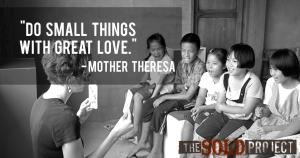Whether you work with formerly exploited women like I have or lead a youth group, whether you're raising kids or managing employees at work, I highly recommend you take a moment and read her thoughts. It just may totally transform the way you interact with and view the people in your life.
Let’s Stop Empowering and Start Inspiring
I’ve been using the word ‘empower’ for years. It’s a great word – one that implies giving dignity to others; the whole ‘give a man a fish and he eats for a day, but teach a man to fish and he eats for a lifetime’ type story comes up when I hear the word empower. It’s even in my organizations mission statement – we seek to empower individuals. In fact, I would go so far as to say that it’s the hot word of today’s non profits. We all want to empower others: the poor, the apathetic, the girl child, the slave, even ourselves! By definition it mean

I graduated with a masters degree in Cross Cultural studies where my focus was on children at risk and international development. I joke that after three years of talking about everything I could possibly do in my life and work (in context of working with the poor) there would be no escaping that I would screw up at some points. We were warned of everything that could go wrong: from the language we use being offensive or not up to date (should ‘at-risk’ come before or after the word child. If it’s put after, then they are first and foremost defined as a child, But if put before, they are defined as being at-risk. Therefore it is politically incorrect to say ‘at-risk child’ but somewhat acceptable to say ‘child at-risk’), to the organizational structure we implemented not having that perfect balance of both empowerment (see, there’s the word again) and accountability. I had a degree in cross cultural work and yet the fear of God put in me that nothing I would do could ever be right (this might be a slight exaggeration but truly, I graduated with a sense of deep humility that development work was not something to be taken lightly).s “to give (someone) the authority or power to do something” or “to make (someone) stronger and more confident, especially in controlling their life and claiming their rights”. It’s a great word.
The word ‘empower’ never raised red flags in these years so I used it confidently and frequently.
Until a dear African American friend enlightened me. It had never crossed my mind before that what this word implies is that I have the power and you do not. Click here to read more.
No comments:
Post a Comment